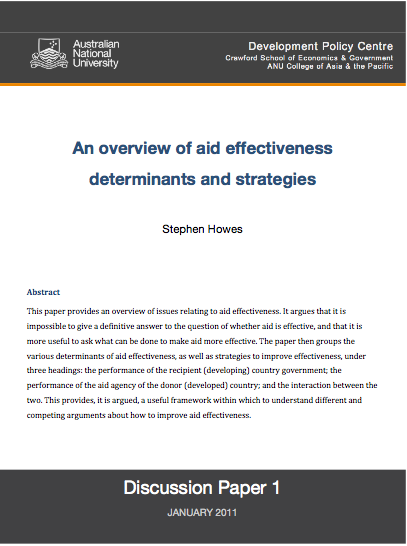This is a guest post by Peter Zoller.
Stephen Howes’ discussion paper on Aid Effectiveness (“An overview of aid effectiveness determinants and strategies”) admirably presented some quite complex issues with great clarity. It is especially worth reading his succinct analysis of the distinctions between the Gospels According to Sachs, Easterly and Collier).
He also cogently sums up some of the problems faced by donor agencies, including their unique position as the only part of government whose principal stakeholders lie elsewhere. Overcoming the agent/principal divergence thereby created is a key challenge for greater aid effectiveness; transparency must play a role in this as a means of ensuring greater accountability of aid officials and their governments for the extent to which the aid they disburse meets the real needs of the intended recipients. Of course, this assumes that “poverty reduction” is really the benchmark for aid effectiveness and Stephen’s paper proceeds on that assumption while noting in passing that other dimensions of “national interest” sometimes intervene. Something of an understatement!
Transparency will however only contribute significantly to effectiveness if it is done honestly and if the mass of data is used to properly assess what has actually be achieved. As the recent exchange generated by Terence Wood’s piece on the Devpolicy blog shows, neither can be taken for granted. The issue of harnessing transparency for the benefit of the poorest and most excluded by ensuring they can access and respond to the data is an especially big challenge and one that NGOs need to address.
That brings me to my main point of contention with Stephen. This concerns the effectiveness of activities intended to create stronger bottom-up demand for better governance – empowerment. He argues that the this is problematic as an aspect of donor efforts to strengthen governance, in part because donor funding of civil society activities to create stronger levels of empowerment can jeopardise the credibility of the NGOs undertaking these activities. This is a risk, but it can be avoided so long as the groups receiving the support establish their credibility by maintaining their independence of approach and demonstrating that they are embedded the communities they serve.
The main threats to donor support for empowerment activities, I suggest, come from different directions. First, they tend to spend small amounts and require relatively high management costs – which presents problems with a spend imperative and Treasury demands to do more with less. Second, evaluation is problematic: The outcomes from empowerment are generally measurable only in the longer term. Also, it is a two stage process – achievement of empowerment and then improved indicators achieved through empowerment – with all the problems of attribution that are thereby entailed. Donor agencies required to provide annual reporting against quantitative indicators can find this all too hard; real effectiveness is sacrificed in favour of more easily measured proxies.
Peter Zoller is a former Australian and British diplomat and aid official who continues to write on aid matters.



Leave a Comment